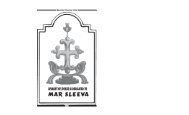kly\mZw
Diocesan Bulletin May 2012 - Eparchy of Idukki
Diocesan Bulletin May 2012 - Eparchy of Idukki
- No tags were found...
Create successful ePaper yourself
Turn your PDF publications into a flip-book with our unique Google optimized e-Paper software.
123456789012345678901234<br />
123456789012345678901234<br />
123456789012345678901234<br />
123456789012345678901234<br />
123456789012345678901234<br />
123456789012345678901234<br />
123456789012345678901234<br />
123456789012345678901234<br />
sabv 2012<br />
himself/herself. The Pope referred to this as “sickness of the spirit”,<br />
with reference to the West, and, with reference to Africa (the<br />
developing world), a spiritual toxic waste which the so-called first<br />
world was exporting and contaminating the people of other continents<br />
with.<br />
Here briefly are five contemporary manifestations of this sickness<br />
of the spirit:<br />
1. The first manifestation is self-sufficiency: Man is only the product<br />
of human culture; and he evolves/fashions himself independently<br />
of human nature and any universal laws inlrerent in his being.<br />
Thus man is the author of himself, of his/her life and of his society;<br />
and not only does he/she replace God, he/she does away with God<br />
completely. 8<br />
2. Secondly and as a consequence, man thinks he/she owes nothing<br />
to anyone, except to himself. 9<br />
3. Thus disconnected from the common good and objective moral<br />
law, man now seeks in majority opinion, however unstable it may<br />
be, the basis for the determination of the morality of law, giving the<br />
impression that norms are created solely by consensus.<br />
4. A technocratic ideology idealizes technical progress and entrusts<br />
the entire process of development to technology alone. It produces<br />
an intoxicating sensation of man’s self-sufficient ‘autonomy’ and a<br />
misguided notion ox ‘absolute freedom. Whatever is technologically<br />
possible can be done, without regard to any norm or ethical<br />
considerations. 10<br />
While each of these ideologies can be rebutted with historical<br />
and philosophical arguments, such debate rarely wins the day. It<br />
may be more effective to consider a deeper form of poverty, namely,<br />
isolation. “If we look closely at other kinds of poverty, including<br />
material forms, we see that they are born from isolation, from not<br />
<strong>kly\mZw</strong><br />
363<br />
sabv 2012<br />
being loved or from difficulties in being able to love. Poverty is often<br />
produced by a rejection of God’s love, by man’s basic and tragic<br />
tendency to close in on himself, thinking himself to be self-sufficient<br />
or merely an insignificant and ephemeral fact, a ‘stranger’ in a random<br />
universe. Man is alienated when he is alone, when he is detached<br />
from reality, when he stops thinking and believing in a foundation. 11<br />
All of humanity is alienated when too much trust is placed in merely<br />
human projects, ideologies and false utopias.” 12<br />
Instead, with her rich patrimony of values and principles,<br />
the Church and her Christians are invited to resist the toxic ideologies<br />
and help others become aware of their true identity and dignity as<br />
sons and daughters of God, establishing democratic institutions, and<br />
recognizing human rights and their corresponding duties; 13 and the<br />
various social ministries of the Church are responses to this challenge<br />
and invitation.<br />
Christian Ministry for integral Human Development<br />
A true understanding of Church ministry starts with the faith<br />
experience of the ecclesial community itself. Responding to God’s<br />
revelation of his love and truth in Jesus, people are transformed by<br />
the power of God’s word and re-socialized by His love in the Holy<br />
Spirit.<br />
This new social reality, the eccesial community, proclaims<br />
the love and truth of the Trinitarian life which surrounds it. 14 From<br />
this experience, people become subjects of love and of truth, called<br />
to become;<br />
• agents of a new freedom and a new way of thinking, instruments<br />
of grace and communion, spreading the Good News of God’s<br />
love, weaving networks of love and of truth.<br />
• builders of an earthly city which anticipates the heavenly city of<br />
God.<br />
364<br />
<strong>kly\mZw</strong>













